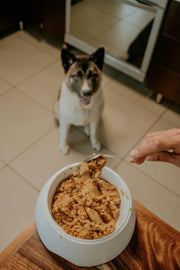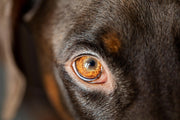
Does your dog's bad breath scare you away? Bad breath in dogs is a common symptom of very serious health issues. A dog's breath is not ordinarily unpleasant. If you notice your pup has stinky dog breath, it may be time to visit the vet.
Main causes of bad dog breath
Bad breath in dogs is more frequent in older dogs but is always the sign of an underlying issue. Therefore, when your dog's breath smells stinky, you may want to look into what could be causing it.
Remember that information in this article does not constitute medical advice, and you should always consult your veterinarian when it comes to your dog's health.
Let's look at the seven most common causes of bad breath in dogs.
Dog's Oral Health Issues: Oral Hygiene and Periodontal Disease

The most frequent causes of bad breath are bad oral hygiene and periodontal disease. In addition, plaque and tartar can build up, and stinky bacteria can develop in your dog's mouth.
A good oral hygiene care routine that includes chewing, brushing your dog's teeth, and an annual cleaning can help resolve this issue.
However, poor oral hygiene can lead to periodontal disease over time. For example, dogs' gums may get inflamed, and when the plaque and tartar build-up push the gums away from the teeth, it creates a new space for bacteria to develop.
Periodontal disease results include cavities, infection, tissue destruction, tooth loss, pus formation, and stinky breath.
Unpleasant Dietary Habits
If your dog has free access to the outside or other pets live in your household, it may explain your dog's bad breath.
Dogs can be gross and may get into the garbage, have access to decomposing animal remains, and casually snack on cat poop. All these habits may cause smelly breath and are also unhygienic.
If you believe that your dog has recently eaten poop by the smell of it, take the necessary measures to prevent that behavior. You may place your cat's litter box inside a tall box for instance: your cat will be able to jump to it, but your dog won't be able to access it.
Diabetes
Even though you probably don't want to, you can tell a lot by your dog's breath. If your dog's bad breath has a sweet or fruity smell, please consult your veterinarian. Sweet, fruity breath is a symptom of diabetes.
Other symptoms of diabetes include more frequent drinking and urination than usual. Your veterinarian will be able to examine your dog and recommend an appropriate treatment.
Kidney Disease
If your dog's bad breath smells like feces or urine, it could be a sign of kidney disease. When your dog's kidneys are not functioning properly, they cannot filter and process toxins and waste materials as they should.
These can build up inside your dog's body which is harmful to your dog's health and cause bad breath. Your veterinarian will be able to diagnose this issue and also see if it's part of a more significant health issue.
Liver Disease
Does your dog sometimes vomit or has diarrhea? Lacks appetite? Has a yellow tinge to his gums? When noticing these symptoms together, they may indicate a liver problem. While liver disease is not the usual leading cause of bad breath in dogs, it's a severe health condition that your veterinarian should examine.
An Imbalanced Oral or Gut Microbiome

An imbalanced oral or gut microbiome could lead to bad breath. It happens when harmful bacteria overpower beneficial bacteria or grow too numerous.
Look into restoring your dog's gut health if you suspect this to be the case.
Allergies and Food Sensitivities
Most people get thrown off by the word "allergy" because it is an umbrella term. However, what is often understood as allergies typically include external infections, skin issues in general, itching, licking, vomiting, and diarrhea.
However, according to veterinarians, only 10% of allergies are food-related. So how do pet parents explain then that a diet change is often the best way to resolve skin issues? The answer is that dogs are sometimes intolerant to certain dog foods without being allergic to them. Refer to my list of the 11 most common food allergens and how to eliminate them from your dog's diet.
If your pet suffers from any allergy symptoms, then this could be the cause of bad breath.
How to treat and prevent bad dog breath
As common as bad breath is among dogs, it is usually treatable. However, it can be frustrating to pinpoint the exact cause of bad dog breath. I suffered from bad breath as a young kid and teenager, and my oral hygiene was impeccable.
It would be so frustrating: my mom or a friend would tell me about my lousy breath just an hour after brushing my teeth and using mouthwash. It took me 20 years to truly understand the underlying cause of dairy intolerance. However, my skin has cleared up since stopping all dairy products, and my bad breath is gone.
Let's look at everything you can do to treat and prevent bad breath in dogs.
Consult a vet to rule out any underlying health issue
Your veterinarian is already aware of the various causes of bad breath. He is most apt to examine and diagnose the underlying issue and explain why your dog's breath smells funky. More often than not, it will come from your dog's teeth or oral health in general.
He may recommend products to promote oral health and solve your dog's stinky breath.
Treat underlying conditions: gum disease, kidney or liver disease, etc.

Once and if your vet diagnoses an underlying health problem, he will recommend a treatment. Treatment may include more visits, exams, and prescription medications. Other times, the treatment is a simple professional dental cleaning. For example, smelly dog breath is often caused by gum inflammation, tooth decay, and food debris.
Keep an eye on your pup's unsupervised snacking
A dead animal may be hiding somewhere behind your house, or your dog may have found your cat's poop more delicious than he should. Depending on where you live and what your dog has access to, make some adjustments to rule out this potential cause of your dog's bad breath.
Routine: oral hygiene care, tooth brushing, dental chews, etc.
Perhaps the most crucial routine to implement is good oral hygiene. It works best when started from a young age, but it can also help older dogs with bad breath. Also, consider buying dental chews that will help reduce tartar build-up and plaque.
Brush your dog's teeth with dog toothpaste. You can even get a dog chew teeth cleaning toy: it's the same as a chew toy, but you can hide cleaning gel inside.
Your pet's oral health: annual professional dental cleanings
Ideally, your dog should have an annual dental cleaning as it is a great way to clean up the tartar build-up and plaque and see any emerging oral health issues.
Look into food intolerances
Last but not least, look into allergies and food intolerances. While it is probably not the leading cause of bad breath, it could be part of it and certainly cause other issues such as itching and scratching.




